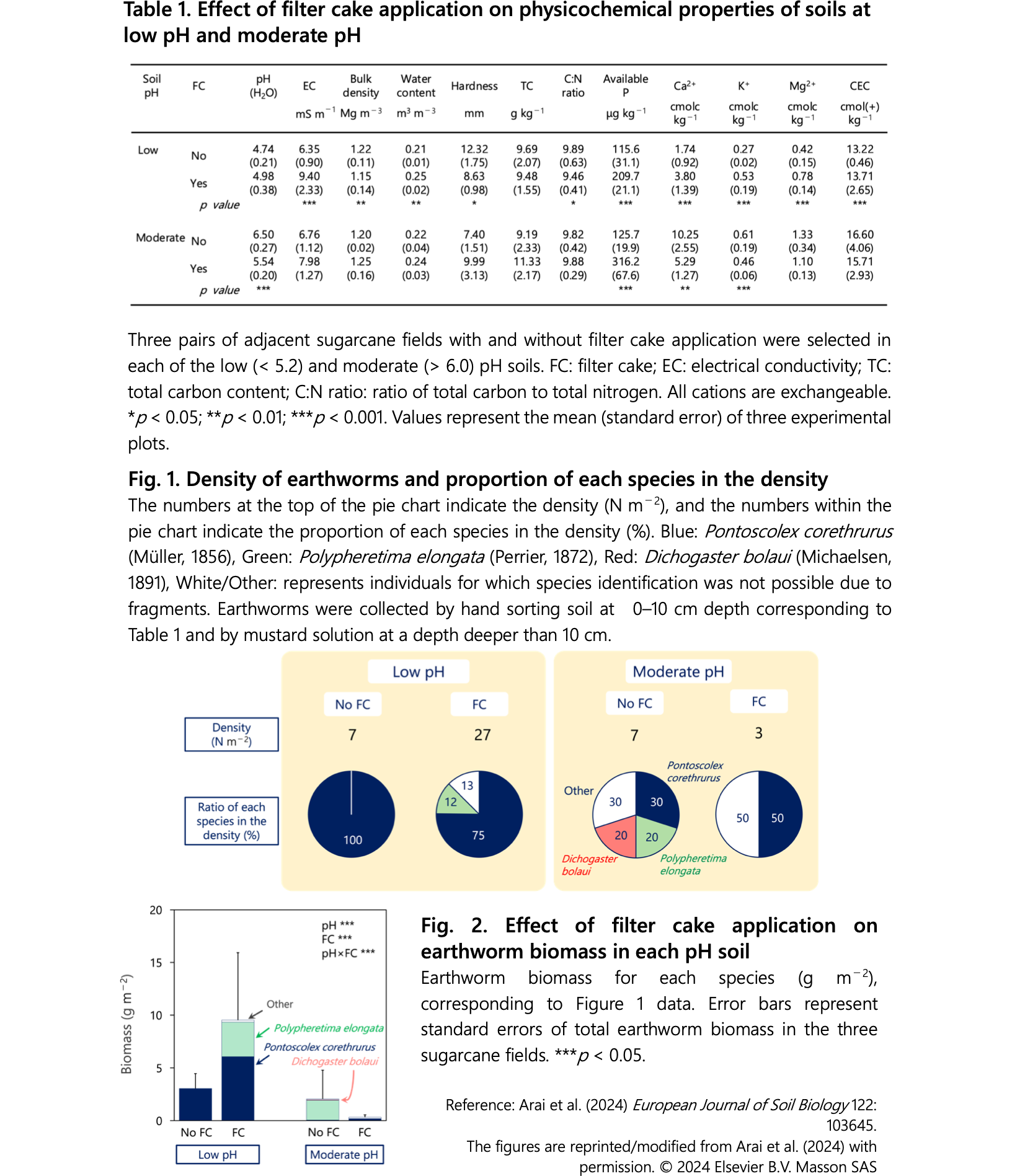The application of filter cakes improves the physicochemical and biological properties of soils with low pH in tropical regions
Description
The application of organic matter is recommended for carbon sequestration and fertility improvement in agricultural soils. Sugarcane is widely cultivated in tropical regions, and a large amount of filter cake (FC) is produced as a by-product in the sugar industry. Earthworms (Oligochaeta) can improve soil functions such as nutrient cycling and water retention by promoting organic matter decomposition and modifying soil structure through their feeding and casting activities. Organic matter application is known to increase earthworm density and biomass. Also, soil pH can influence earthworm species composition, density, and biomass. However, the effects of organic amendments on these characteristics of earthworms at different soil pH values have not been fully understood, especially in tropical agricultural fields.
We conducted a field survey to evaluate the effects of a single application of FC on soil physicochemical properties and earthworm species, density, and biomass in sugarcane fields with two different soil pHs (low pH soil : <5.2, moderate pH soil : >6.0) on Ishigaki Island, Okinawa Prefecture, Japan. FC application decreased soil bulk density and hardness, and water content increased in the low pH soil. In addition, available P content and Ca2+, K+, and Mg2+ contents increased about 2-fold, and cation exchange capacity also increased (Table 1). In the moderate pH soil, FC application did not improve physical properties, although the available P increased 2.5-fold, and soil pH and Ca2+ and K+ contents decreased. Regardless of soil pH and FC application, Pontoscolex corethrurus (Müller, 1856) was dominant (Fig. 1) and accounted for approximately 30% to 100% of the density in each treatment. In addition to P. corethrurus, Polypheretima elongata (Perrier, 1872) was observed in the low pH soil with FC application. Earthworm biomass increased about 3-fold in the low pH soil but decreased by about 80% in the moderate pH soil with FC application (Fig. 2). Therefore, FC application to low pH soils can improve both physicochemical and biological properties of the soil.
Our results suggest that the application of FC, an underutilized organic resource, is expected to improve soil functions such as nutrient cycling and water retention in low pH soils through enhanced biological properties. Since this conclusion is based on data from a single application of FC, the effects of continuous application of FC and the effects of application of organic materials with different chemical properties from FC on soil physical and chemical properties need to be investigated. Additionally, future evaluations should include yield assessments.
Figure, table
- Research project
- Program name
- Term of research
-
FY2021-2023
- Responsible researcher
-
Arai Miwa ( Crop, Livestock and Environment Division )
ORCID ID0000-0002-5377-7820KAKEN Researcher No.: 20817217Ikazaki Kenta ( Crop, Livestock and Environment Division )
ORCID ID0000-0001-5460-8570KAKEN Researcher No.: 70582021Teraiima Yoshifumi ( Tropical Agriculture Research Front )
Anzai Toshihiko ( Tropical Agriculture Research Front )
Minamiya Yukio ( Tochigi Prefectural Museum )
ORCID ID0009-0002-0458-5942KAKEN Researcher No.: 70782556 - ほか
- Publication, etc.
-
Arai et al. (2024) European Journal of Soil Biology 122: 103645.https://doi.org/10.1016/j.ejsobi.2024.103645
- Japanese PDF
-
2024_A02_ja.pdf1.14 MB
- English PDF
-
2024_A02_en.pdf412.63 KB
* Affiliation at the time of implementation of the study.

